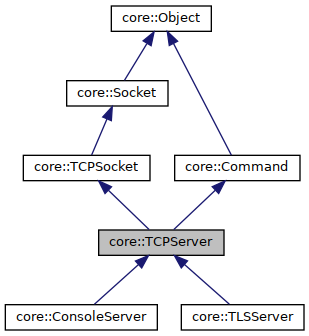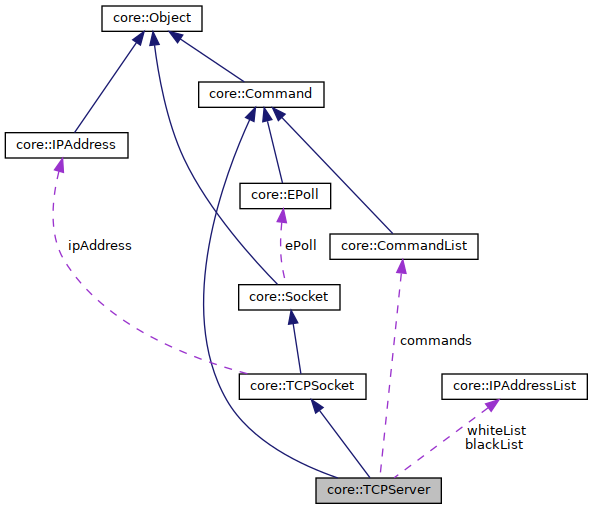#include <TCPServer.h>


Public Member Functions | |
| TCPServer (EPoll &ePoll, IPAddress address, std::string text="") | |
| ~TCPServer () | |
| void | removeFromSessionList (TCPSession *session) |
| virtual void | sessionErrorHandler (std::string errorString, std::stringstream &out) |
| virtual TCPSession * | getSocketAccept (EPoll &epoll) |
| void | output (TCPSession *session) |
| Output the consoles array to the console. | |
 Public Member Functions inherited from core::TCPSocket Public Member Functions inherited from core::TCPSocket | |
| TCPSocket (EPoll &ePoll) | |
| TCPSocket (EPoll &ePoll, std::string text) | |
| void | connect (IPAddress &address) |
| virtual void | output (std::stringstream &out) |
 Public Member Functions inherited from core::Socket Public Member Functions inherited from core::Socket | |
| Socket (EPoll &ePoll, std::string text="") | |
| ~Socket () | |
| void | shutdown (std::string text="unknown") |
| void | setDescriptor (int descriptor) |
| Set the descriptor for the socket. More... | |
| int | getDescriptor () |
| Get the descriptor for the socket. | |
| bool | eventReceived (struct epoll_event event) |
| Parse epoll event and call specified callbacks. More... | |
| int | write (std::string data) |
| void | write (char *buffer, int length) |
| void | output (std::stringstream &out) |
| virtual void | onRegister () |
| Called before the socket has registered with the epoll processing. More... | |
| virtual void | onRegistered () |
| Called after the socket has been registered with epoll processing. | |
| virtual void | onUnregister () |
| virtual void | onUnregistered () |
| Called when the socket has finished unregistering for the epoll processing. More... | |
| bool | needsToWrite () |
 Public Member Functions inherited from core::Command Public Member Functions inherited from core::Command | |
| virtual bool | check (std::string request) |
| virtual void | output (Session *session) |
| void | setName (std::string name) |
| std::string | getName () |
Public Attributes | |
| IPAddressList * | blackList |
| IPAddressList * | whiteList |
| std::vector< TCPSession * > | sessions |
| CommandList | commands |
 Public Attributes inherited from core::TCPSocket Public Attributes inherited from core::TCPSocket | |
| IPAddress | ipAddress |
 Public Attributes inherited from core::Socket Public Attributes inherited from core::Socket | |
| bool | reset = false |
 Public Attributes inherited from core::Object Public Attributes inherited from core::Object | |
| std::string | name |
| std::string | tag |
Protected Member Functions | |
| void | onDataReceived (std::string data) override |
| int | processCommand (std::string command, TCPSession *session, std::stringstream &data) override |
 Protected Member Functions inherited from core::Socket Protected Member Functions inherited from core::Socket | |
| void | setBufferSize (int length) |
| int | getBufferSize () |
| virtual void | onDataReceived (char *buffer, int len) |
| virtual void | receiveData (char *buffer, int bufferLength) |
Additional Inherited Members | |
 Protected Attributes inherited from core::Socket Protected Attributes inherited from core::Socket | |
| EPoll & | ePoll |
| bool | shutDown = false |
Detailed Description
Manage a socket connection as a TCP server type. Connections to the socket are processed through the accept functionality.
A list of connections is maintained in a vector object.
This object extends the BMACommand object as well so it can be added to a Console object and process commands to display status information.
Constructor & Destructor Documentation
◆ TCPServer()
The constructor for the BMATCPSocket object.
- Parameters
-
ePoll the EPoll instance that manages the socket. url the IP address for the socket to receive connection requests. port the port number that the socket will listen on. commandName the name of the command used to invoke the status display for this object.
- Returns
- the instance of the BMATCPServerSocket.
◆ ~TCPServer()
| core::TCPServer::~TCPServer | ( | ) |
The destructor for this object.
Member Function Documentation
◆ getSocketAccept()
|
virtual |
getSocketAccept is designed to allow a polymorphic extension of this object to return a type of object that extends the definition of the server socket. Returning the appropriate session object that extends from Session provides the mechanism where the server can select the protocol dialog for the desired service.
Reimplemented in core::ConsoleServer.
◆ onDataReceived()
|
overrideprotectedvirtual |
Override the virtual dataReceived since for the server these are requests to accept the new connection socket. No data is to be read or written when this method is called. It is the response to the fact that a new connection is coming into the system
- Parameters
-
data the pointer to the buffer containing the received data. length the length of the associated data buffer.
Reimplemented from core::Socket.
◆ processCommand()
|
overrideprotectedvirtual |
This method is called when the Command associated with this object is requested because a user has typed in the associated command name on a command entry line.
- Parameters
-
the session object to write the output to.
Reimplemented from core::Command.
Member Data Documentation
◆ blackList
| IPAddressList* core::TCPServer::blackList |
If not NULL the blacklist object can be assigned to this server socket and the server IP addresses connecting to the server attempting to accept a socket are contained in this list then the connection is rejected and no accept is granted.
◆ commands
| CommandList core::TCPServer::commands |
The commands object is a CommandList and is used to store Command objects to be parsed and run as data comes into the session.
◆ sessions
| std::vector<TCPSession *> core::TCPServer::sessions |
The list of sessions that are currently open and being maintained by this object.
◆ whiteList
| IPAddressList* core::TCPServer::whiteList |
If not NULL the blacklist object can be assigned to this server socket and the server IP addresses connecting to the server attempting to accept a socket are contained in this list then the connection is rejected and no accept is granted.
The documentation for this class was generated from the following files:
- TCPServer.h
- TCPServer.cpp
 1.8.17
1.8.17